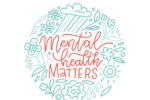May is National Mental Health Month

Increasing Care for Mental Health
Mental health includes our emotional, psychological, and social well-being. It is a huge and complex facet of our lives that affects how we think, feel, and act. It plays a role in how we handle stress, relate to others, and in decision making. Beautifully manifold and mysterious, what we do not know about mental health far outweighs what we do, but what we do know is that mental health deserves our attention and our efforts.
In 1949, May was designated Mental Health Month and began as a way to raise awareness, provide support, advocate for policies that support people with mental illness and their families, and end the stigma surrounding mental health. Since that time, we’ve come a long way in our understanding of mental health, its connection to overall health and how our lifestyles play an important role. Today, we embrace mental health as we navigate its labyrinthine diversities.
Mental Health is for Everyone
While 1 in 5 people will experience a mental illness in their lifetime, everyone faces challenges that impact their mental health. Mental health disorders do not impact “someone else”. They impact all of us without prejudice, no matter our sex, age, race, or social class, and we must care for our minds just like we care for the rest of our body. It is so paramount to our lives that the World Health Organization famously says, “There is no health without mental health.”
The Continuum of Health
We recognize that there are degrees of health. People move on a continuum ranging from great or good health to poor health, to illness or disability. For example, some people have good health and have no or few problems going about their lives. Some people experience serious health problems, and their poor health has a negative impact on their life. Some people have serious health problems that last for a long duration, and others have serious health problems that may resolve quickly. Most individuals fall somewhere in the middle — they’re in generally good health, though problems may occasionally come up. Mental health is the same way. It exists on a continuum and requires constant but varying degrees of care.
Modern Mental Health Challenges
One of the biggest challenges in modern mental health is that many people receive little or no treatment or support. The reasons for this are many. Worldwide healthcare professionals work with limited resources and mental health resources constitute only 5.8% of their total health expenditures even though mental health issues are responsible for nearly 20% of disease according to the WHO.
Another problem is the shift in work and workplace demands. Modern technology has led to workers always being “on the job”, competing in a global marketplace, and under more isolating conditions. Work-related anxiety and mental health disorders are on the rise. According to a report from Mind Share Partners, only 37% of workers see company leadership as mental health advocates. Perhaps this is because, according to an Accenture survey, only 14% have ever heard leadership talk about the importance of mental health and fewer than 10% have heard leadership talk about how it has impacted them personally.

New Understanding, New Opportunities
More than ever, mental health experts realize that mental illness, like any other chronic illness, will become debilitating if it is left unaddressed. To ignore the symptoms will only lead to more self-destructive behaviors. As individuals, as leaders, as neighbors, we are modeling disclosure, vulnerability, and advocacy, setting the stage for greater awareness and acceptance.
Virtual Resources Promote Healthier Reality
While technology plays a role in adding stressors to our lives, it also plays a huge role in expanding the availability of affordable and flexible mental health resources. In fact, with the breadth of virtual resources available today, we are no longer limited in access or types of support from informal online support groups to text therapy.
Mental health advocate and creator of the self-care rewards app Mind Star Health, Kristin Rulon believes that technology can play a huge role in improving our personal mental health practices.
“People are addicted to their phones. Why not use that addiction for something positive? There is also anonymity and people tend to be more forthcoming of their issues online. Nothing is perfect but if a mental health app can save even one person’s life, then it’s worth it,” asserts Rulon.
On the app, users are rewarded for their self-care routine with free or discounted products, services or experiences. Users can track their self-care routine over time, allowing them to see their progress and celebrate themselves while increasing awareness of the impact self-care has on mental wellbeing. Users can also easily connect with health professionals in the health care marketplace and are more apt to do so with the resource right at hand and via a familiar platform.
Improving Your Mental Health
As awareness and tools surrounding mental health increases, so too our understanding of the need to take personal ownership of our health. Today, we are finding better ways to balance our life. Individuals are utilizing stress reduction strategies such as exercising, journaling, and meditating. We are also adopting recommendations from the National Mental Health Association such as getting better sleep, and better nutrition; setting realistic goals, and creating time for hobbies and fulfilling activities. Most importantly, we are seeing seeking help as a sign of strength, recognizing that getting appropriate help leads to recovery and improved lives.
Each day someone near us faces mental health challenges such as exhaustion, stress, anxiety, and depression. Each of us has the power to help by being transparent about our own needs and encouraging others to provide the best possible mental health to themselves by accessing the wealth of resources available today.
For More Information
Mindshare Partners: www.mindsharepartners.org/mentalhealthatworkreport
National Council for Behavioral Health: www.thenationalcouncil.org/mental-health-month/
Mind Star: www.mindstarapp.com






